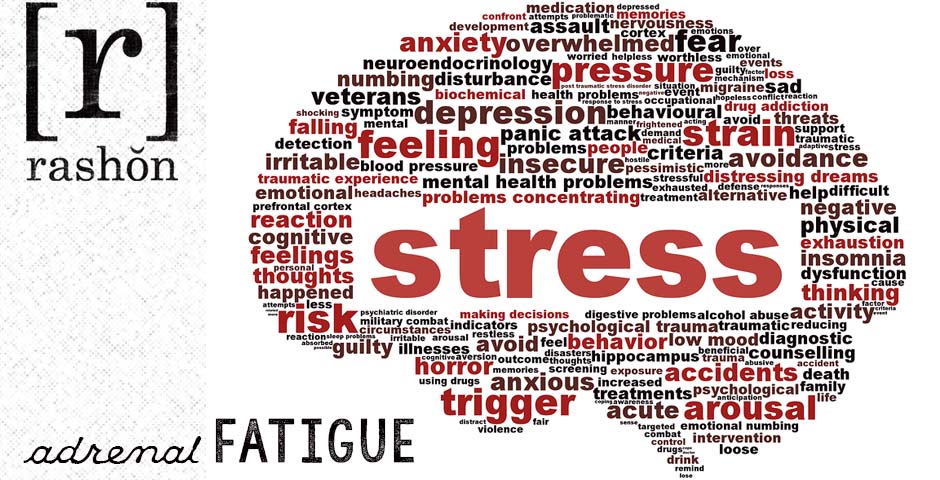Alright, we’ve finally made it to Part 3 in my series on Adrenal Fatigue. In Part 1, I talked about what the adrenal glands are, and how stress affects our adrenals and our body. In Part 2, I got personal and told you about my own experience with adrenal fatigue. If you haven’t read the other posts, be sure to check them out for more information.
Now that you’ve got an understanding of what Adrenal Fatigue actually is, and what it can feel like to go through it, we’ll talk a bit more about some of the signs and symptoms, and some things you can do to support your body.
Signs and Symptoms of Adrenal Fatigue*
- Chronic fatigue – feeling exhausted all, or most, of the time
- Beginning or worsening allergies – hives, asthma, seasonal allergies, food allergies or sensitivities
- Low blood sugar
- Unable to fall asleep – feeling tired and wired
- Unable to stay asleep – waking up during the night
- Salt cravings
- Feeling overwhelmed and unable to handle any stress – good or bad
*Note that these are general symptoms, and may be indicative of other health issues.
Adrenal fatigue can generally be identified by the symptoms alone, but your doctor can order a saliva test that will check hormone (including cortisol) levels, DHEA levels and gliadin antibodies, all of which are indicators of stress. If you think you might be experiencing adrenal fatigue, I urge you to become your own best health advocate and seek out health practitioners that are willing to help you treat it.
Managing Stress
Managing stress is the first line of defense for adrenal fatigue. I know the words “manage stress” are thrown around a lot. We all hear it, and then most of us ignore it. We have all become accustomed to living under massive amounts of stress, staying busy and keeping a to-do list a mile long. Trust me, I know because that’s how I operate, and that’s how I got into this health mess of my own. I am my own worst enemy when it comes to stress.
Since stress is at the root of adrenal fatigue, and a host of other health issues, it really is vital that you learn how to deal with stress in positive ways, find outlets for stress that work for you and make time to relax and enjoy life. Here are some general tips for dealing with stress:
- Address the issues. Evaluate the source(s) of stress and find positive ways to deal with those situations. Make a plan, and put it into action. Ignoring stress or problems won’t make it go away, and usually just creates more stress in the long run.
- Learn to say no when you have enough on your plate. This is a big one for a lot of people. When you’re already busy and overworked, adding more things to your list will only make things worse. I’ll say it again (and make it bold!): learn how to say no.
- Spend time with your friends and loved ones. Get involved in your community. Volunteer for a local
 organization with a mission you’re passionate about. Healthy connections and relationships give you a good support system and a positive energy outlet.
organization with a mission you’re passionate about. Healthy connections and relationships give you a good support system and a positive energy outlet. - Exercise regularly, but don’t overdo it. If you feel tired, don’t force a strenuous workout as this will only add to the stress your body is under. Yoga and stretching are great for times of stress, or just when you feel tired.
- Sleep as much as necessary to give your body a chance to rest and recover. Getting to bed by 10:30 pm, and sleeping 8 to 9 hours is ideal.
- Make time for hobbies and other fun activities that you enjoy, and that help you to relax.
- Talk to a counselor or therapist to learn ways to handle emotions and specific stressors in your life.
- Engage in spiritual practices. These will look different for everyone. It may be prayer, going to church, meditation, yoga, a long walk, time in nature, etc. Whatever works for you.
If stress is a major factor for you, and it’s affecting your health, consider working with a Nutrition Consultant who can help you with managing stress and supporting your health through proper nutrition. You can email me for more information about working together.
Nutritional Guidelines for Adrenal Fatigue
Everyone is different, so working with a Nutrition Consultant can be really helpful when determining the best nutritional course of action. That being said there are some general guidelines you can implement to start healing your body if you’re dealing with adrenal fatigue. Note that I will pretty much never give specific supplement dosage recommendations in my posts because this varies widely from person to person. Work with your doctor or Nutrition Consultant to determine what is best for you.
General Daily Guidelines
- Eat nutrient-dense foods – organic, colorful fruits and vegetables.
- Focus on clean protein, high-quality healthy fats (grass-fed butter, extra virgin olive oil, coconut oil, avocados, avocado oil, nuts and seeds, etc.), and moderate carbohydrates. Carbohydrates should be mainly leafy greens and vegetables. Limit starchy vegetables and whole grains.
- Eat within an hour of waking to keep blood sugar stable. Avoid starchy carbohydrates first thing in the morning. Eat plenty of protein, healthy fats and vegetables in the morning. Example: 2 egg omelette with onion, spinach, mushrooms and broccoli, 2 oz. breakfast sausage, 1/4 of an avocado or cook your omelette in 2 Tbsp. grass-fed butter.
- Eat regularly and never skip meals.
- Adrenal fatigue can cause the loss of sodium, an important electrolyte, in the body. Add a pinch of Redmond’s REAL Salt or high-quality sea salt to each meal to boost sodium levels and replenish minerals.
General Nutrient Recommendations to Support the Adrenal Glands
- Vitamin C is a potent antioxidant that is necessary for the production of norepinephrine and epinephrine. It also boosts the immune system which is often suppressed with adrenal fatigue. Vitamin C is in bell peppers, spinach and other leafy greens, parsley, strawberries, citrus fruit, and in cruciferous vegetables like broccoli, cauliflower and brussels sprouts.
- Vitamin B5 (Pantothenic Acid) plays a critical role in the production of adrenal hormones and red blood cells. It is called the “anti-stress” vitamin because of the central role it plays in adrenal function. Some food sources of B5 are broccoli, egg yolks, mushrooms, nutritional yeast, meat, poultry, seafood and sweet potatoes.
- Magnesium is vital for energy production, protein, formation and cellular replication. Known as the relaxation mineral, magnesium helps to protect the heart and lower blood pressure, making it vital for supporting the body in healing from the stress response. Magnesium can be found in dark, leafy greens, almonds, broccoli, flaxseed, kelp, raw pumpkin seeds and halibut.
- Potassium is an electrolyte that helps with functions throughout the body. It helps regulate kidney and adrenal function. The adrenal glands produce a hormone called aldosterone that tells the kidneys how much sodium to retain. If potassium is out of balance, it will negatively affect the kidneys and the adrenals. Some of the foods that contain potassium are avocado, raw tomatoes, bananas, lima beans, potatoes, chicken, salmon, tuna, and flounder.
- Phosphatidylserine is an important phospholipid membrane component that plays a key role in cell cycle signaling. Phosphatidylserine can be found in soy lecithin, mackerel, herring, tuna, and in organ meats. Therapeutically, it can be taken as a supplement, and used to help lower chronically high cortisol levels.
- Licorice root extract can be helpful in raising cortisol levels when it is low. Licorice should be avoided by those with high blood pressure.
- Adaptogens are unique herbs that help to balance, restore and protect the body. While they don’t have specific actions, they help the body to respond to stressors and normalize physiological functions. Some examples of adaptogens are Panax ginseng, Siberian ginseng, Ashwagandha, Holy Basil, Rhodiola and Astragalus. Ashwagandha is known to be very calming, and is especially good for women. Holy Basil can be found as a tea called Tulsi Tea. Many adaptogens can be found as teas and a cup or two can be consumed daily.
- Gingko Biloba is a potent antioxidant that fights free radical damage. It helps to protect the adrenals from any imbalances in the hypothalamus that free radical damage might create.
Foods to Avoid with Adrenal Fatigue
- Refined carbohydrates. These are processed carbs such as packaged foods, white flour, chips, crackers, cookies, white bread, bagels, pasta, etc.
- Gluten
- Dairy
- Soy
- Eggs
- Corn
- Caffeine
- Sugar
- Alcohol
All of these fall into one (or more) of several categories: reactive foods, foods that cause blood sugar spikes, foods that can cause chronic inflammation, foods that can create stress within the body (thereby overworking the adrenals and raising cortisol levels), foods that overstimulate the endocrine system, foods that cause hormone and chemical imbalances. Note that some of these foods may not be reactive for all people, but the musts to avoid for adrenal fatigue are refined carbohydrates, gluten, caffeine, sugar and alcohol. These foods cause way too many problems in the body and can make adrenal fatigue worse.
How I’ve Managed Adrenal Fatigue
As I mentioned in Part 2 of this series, I’ve been working with an acupuncturist and Chinese medicine herbalist in order to get my own health issues straightened out. I’ve been working to support both adrenal fatigue and the hypothyroid symptoms that it’s caused. I’m having regular acupuncture treatments, and taking adaptogenic herbs on a daily basis to support my adrenals. I’m also taking extra vitamin D3 and a daily probiotic. I take Inositol daily, which helps with anxiety. I also eat 3-4 raw brazil nuts each day for extra selenium to support my thyroid. I just consider them part of my daily vitamin intake.
Food-wise, I’m very careful when it comes to carbs. I don’t want to spike my blood sugar, so I avoid refined carbs, and have limited whole grains and starchy vegetables. When I do have carbs, I make sure I have plenty of proteins and healthy fats to help slow digestion and decrease blood sugar spikes. I do my best to avoid sugar. I drink green tea, dandelion tea or chamomile tea instead of coffee. On the rare occasion that I have coffee, it’s usually decaf. I try to get 2-3 cups of vegetables/leafy greens into every meal because they are packed with vitamins, nutrients and antioxidants my body needs to heal. Alcohol is an occasional indulgence for me, although this really has nothing to do with adrenal fatigue. I don’t like how I feel when I drink alcohol (even just one drink), so I just don’t drink that often, and reserve it for special occasions. As you know, I already eat gluten free (but I avoid gluten free replacement foods!), and I do limit dairy, soy and corn, but I don’t completely eliminate those from my diet. Overall, I try to eat balanced meals, with real, whole foods to nourish my body.
Learning how to let go of stress and not being such a perfectionist have been really important for me in beginning to heal. I’ve found my own outlets for stress and learned to say no when I’m really tired and just need some down time. I’ve had to say no to some things I really wanted to because I knew that ultimately it was going to be too much (with all of my other life obligations) and set me back health-wise. It’s not always fun, but sometimes you have to put your health first. I’ve got an incredible husband, family and group of friends that have been really supportive. My poor husband has had to go through a lot of ups and downs with my health and anxiety the past several months, but he’s been so encouraging and supportive, which has made all the difference in me getting through this.
I’m not 100% better, but I’m getting there step by step. If you’re dealing with adrenal fatigue or other health issues, and need help and support, send me an email. I’d love to see if working together would be a good option! Feel free to ask questions in the comments, and I will get back to you with answers. Know that if you’re feeling these symptoms, there is good health to be had! Once you start supporting your body with stress management and good nutrition, healing can begin!
Disclaimer: The information provided on this website is for educational purposes only. It is not intended to treat or diagnose any health condition. Please consult a doctor, healthcare professional or a Nutrition Consultant for information specific to your health needs.




0 Comment